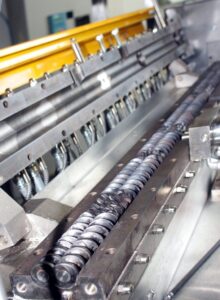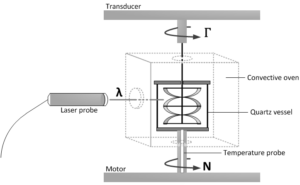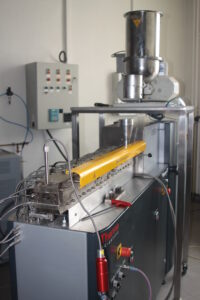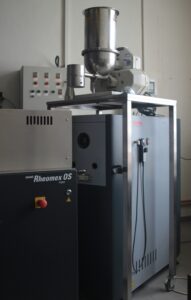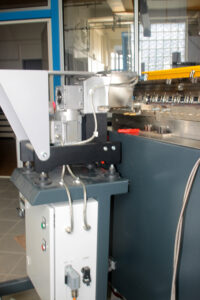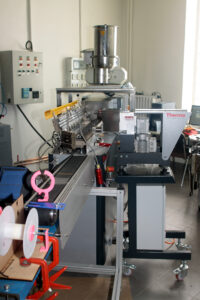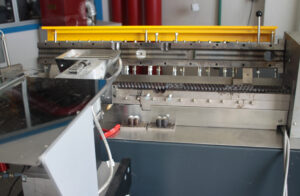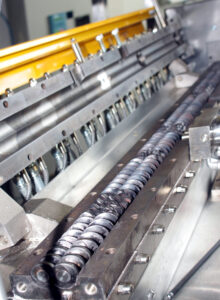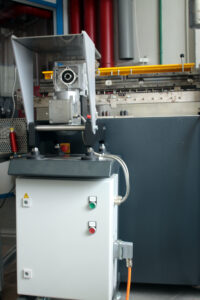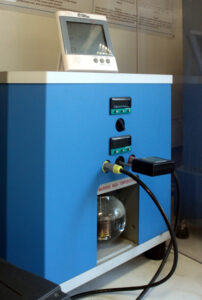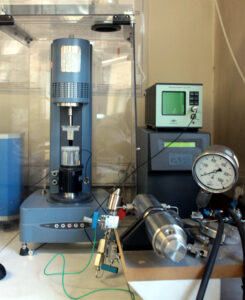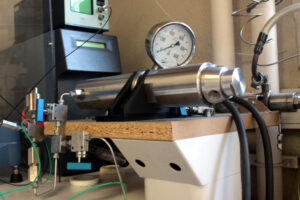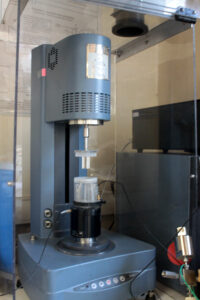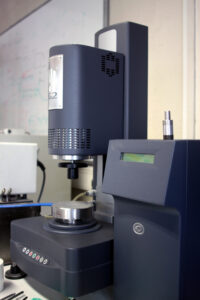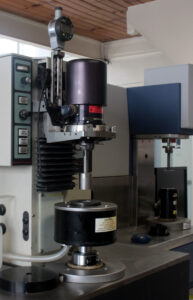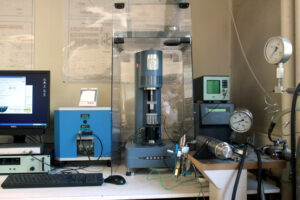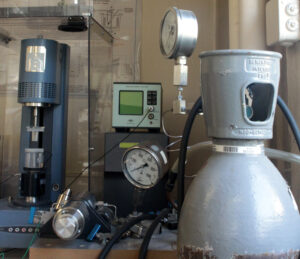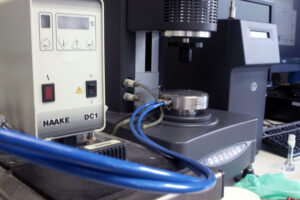Génie des Produits
Process Engineering for Products and Materials
This area develops the concepts and methodologies needed to design and develop processes for the production of multi-structured products/materials with specific properties/functions. Its scientific approach is characterized by :
- an integrated, multi-scale approach from elementary processes to end-use properties and functions via process control;
- transdisciplinarity (rheology, computational fluid mechanics, materials science, chemistry and physical chemistry);
- development of advanced process characterization methods and tools: systemic rheology, on-line metrology, modeling and simulation;
The main scientific challenges of the axis lie in :
- development of models for predicting usage properties based on initial compositions;
- understanding and controlling the coupling of transfer phenomena at different process scales;
- multi-scale structuring of non-equilibrium, rheologically complex and evolving multi-constituent media;
- analysis and (local) control of processes and products, and transposition of batch processes to continuous processes;
- multi-criteria optimization of processes and products, integrating process resource efficiency;
To meet these challenges, the axis has structured its research activities around the following three themes, which share a common scientific approach:
Theme 1: Elaboration and recycling of polymeric materials
Theme 2: Chemical Engineering of Rheologically Complex Media
Theme 3: Elaboration and Forming of Divided Materials
Process engineering for the production and recycling of polymeric materials
The aim of this theme is to develop knowledge, concepts, theories, methods and tools for processes to produce new polymer-based materials and products with high added value and controlled usage properties. For many years, our activities have focused on reactive extrusion and polymerization processes. These activities have continued over the last five years, but with one major change: the processes and materials we develop now take into account issues relating to renewable resources, secondary raw materials and the environment. We are also looking into additive manufacturing processes (3D printing) and the development of new polymer materials for transport and energy.
Skills
- Developing materials with controlled properties
- Multi-criteria optimization, decision-support tools
- Specific polymerization reactors, in-line sensors
- Polymerization in single- and multiphase media
- Reactive and non-reactive extrusion (micro/nano structuring, stabilization of multiphase materials, extrusion under supercritical conditions, purification of polymers by devolatilization, etc.).
- Stabilization of multiphase materials
- Dynamic optimization of polymerization processes.
- Control of polymerization reactors.
Equipments
- Tools for the synthesis, elaboration and shaping of polymeric materials
- Rheological analysis
- Thermo-mechanical analysis
Elaboration and shaping of divided materials
The activities of this theme concern the elaboration of solid particles and their shaping in order to obtain controlled functions of use. The topics covered are related to product engineering, with the aim of proposing the best strategy for obtaining one or more properties for solid products, through the choice of synthesis conditions, process control or formulation modifications. Researching the link between physical or chemical characteristics and properties of use is also part of the approach, which can be experimental or theoretical.
Skills
- Synthesis and functionalization of fluorescent nanocrystals (quantum dots), organic/inorganic hybrid materials and heterostructured nanomaterials for catalysis or photocatalysis.
- Precipitation or crystallization processes to obtain products with controlled properties. Applications in hydrometallurgy, water treatment, nanoparticle synthesis, melt crystallization
- Forming processes for divided solids: powder mixing, powder rheology, wet granulation, compression, extrusion.
Equipments
- Precipitation and crystallization reactors (laboratory scale (1 to 2.5L) and pilot scale (10 to 20L)): rotating disk,
- vortex, sludge recirculation, fluidized bed reactors
- High-speed mixer-granulator (MiPro Pro-C-epT, 500 mL)
- Turbula mixer
- INSTRON-type Universal Testing Machine (0-10 N; 0-2 kN; 0-50 kN sensors) equipped for Compression, Tension and Flexure tests
- Porosimeters (Macropores unit 120, Porosimeter 2000)
- Pycnometer (Quantachrome helium stereopycnometer)
- Specific surface (Sorptomatic 1990)
- Laser granulometers (Matersizer Malvern Instruments, Coulter Multisizer II)
- Electron microscope (Jeol JSM T330A)
- Spray drying (BUCHI Mini Spray Dryer)
Chemical Engineering of Rheologically Complex Media
The creation of an industrial chair in this field in 1991 (GEMICO) has enabled us to develop national and international expertise in the "processes-processes-products" triptych. Mastering this triptych necessarily involves establishing relationships between the macroscopic behavior of the materials in question, their microscopic structure and the physico-chemical processes at play, particularly at interfaces, during their elaboration. The industrial sectors concerned are as diverse as cosmetics, building materials, food processing and pharmaceuticals. Such an objective implies the development of structural behavior laws, integrating the generally non-linear and non-equilibrium character of rheologically complex, polyphasic, evolving and reactive media via an integrated, necessarily multi-scale and multi-disciplinary approach.
Skills
- Systemic rheology
- Rheophysics
- Rheology of granular media
- Emulsions and emulsification
- Matter transfer in complex media
- Agitation/mixing in complex media
- Computational fluid mechanics
- Interface characterization and modification Surfactant synthesis
Equipments
- ARES impressed strain rheometer.
- Imposed deformation rheometer RDA2.
- Two RFS2 rheometers.
- Imposed-strain rheometer AR2000 equipped with a rheological characterization cell for granular and powdery
- media under vibration, and a pressure measurement cell (up to 300 bar and 300°C) for characterization under supercritical CO2.
- ARG2 imposed stress rheometer equipped with an interfacial rheology module.
- RM 180 viscosimeter.
- MALVERN MASTERSIZER2000 laser granulometer.
- LEICA microscope with camera.
- OLYMPUS microscope with LINKAM CSS450 shear cell.
- Instrumented EIRICH RO2 reactor/mixer (3-5 liters).
- RAYNERI turbotest stirrer.
- ML MICROFLUIDICS microfluidizer.
- RM200 viscosimeter
- High-speed camera >Speed Sense DANTEC
Members
Maria Paula ARIAS BENAVIDES, CDD - Ingénieur d'études (catégorie A)
Mohammad Mahdi ASSAF, Doctorant
Arnaud AYMES, Assistant ingénieur
Arnaud AYMES, Assistant ingénieur
Roberto BARBANO, Doctorant
Paula Andrea BARRERA ARIZA, Doctorant
Sophie BEAUBIER, Maître de Conférences
Maria Graciela CARES PACHECO, Maître de Conférences
Pilar Milagros CHAVEZ LINARES, Doctorant
Bilel CHOUCHENE, CDD - Ingénieur d'études (catégorie A)
Bienvenu Désiré DAMIBA, Doctorant
Alice DECHEPPE, Doctorant
Steve DJIAZET, Chercheur
Véronique FALK, Professeur des universités
Véronique FALK, Professeur des universités
Véronique FALK, Professeur des universités
Romain FAURE, Doctorant
Xavier FRAMBOISIER, Ingénieur de recherche
Michal GACKOWSKI, Doctorant
Fanny GALLO, CDD (catégorie B)
Ola HAIDAR, Doctorant
Sandrine HOPPE, Chargé de recherche CNRS
Guo-Hua HU, Professeur des universités
Romain KAPEL, Professeur des universités
Romain KAPEL, Professeur des universités
Lilian KARCHER, Doctorant
Fatima Zahra KDAH, Doctorant
Fatima Zahra KDAH, Doctorant
Richard LAINE, Ingénieur d'études
Marie LE PAGE MOSTEFA, Maître de Conférences
Maud LEBRUN, Assistant ingénieur
Maud LEBRUN, Assistant ingénieur
Maud LEBRUN, Assistant ingénieur
Cécile LEMAITRE, Maître de Conférences
Alex LEMARINEL, Doctorant
Liwei LI, Doctorant
Philippe MARCHAL, Ingénieur de recherche
DIMITRIOS MEIMAROGLOU, Maître de Conférences
Odile MESIERES, Doctorant
Fabien MILLAN, Doctorant
Sher MOHD, Doctorant
Ugo MURAT, Doctorant
Cécile NOUVEL, Professeur des universités
Cécile NOUVEL, Professeur des universités
Juan David ORTIZ MORALES, Doctorant
Quentin-Arthur POUTREL, Chargé de recherche CNRS
Maria PROKOPIDOU, Doctorant
Lorena Eugenia RAMIREZ VELAZQUEZ, Doctorant
Thibault ROQUES-CARMES, Professeur des universités
Véronique SADTLER, Professeur des universités
Benjamin SANDEI, Doctorant
Raphaël SCHNEIDER, Professeur des universités
Cornélius SCHRAUWEN, Maître de Conférences
Shubham SHISHODIA, Doctorant
Qingwei SUN, Doctorant
Apolline TOLLITTE, CDD - Ingénieur d'études (catégorie A)
Victor VASTRA - CASTEL, Doctorant
Pan WANG, Doctorant
XIAOLONG WANG, Doctorant
Zixuan WANG, Doctorant
Sixia YE, Doctorant
Mibé Ibrahim YEO, Doctorant
Mibé Ibrahim YEO, Doctorant
Shuo ZENG, Doctorant
Hengkuan ZHANG, Doctorant
